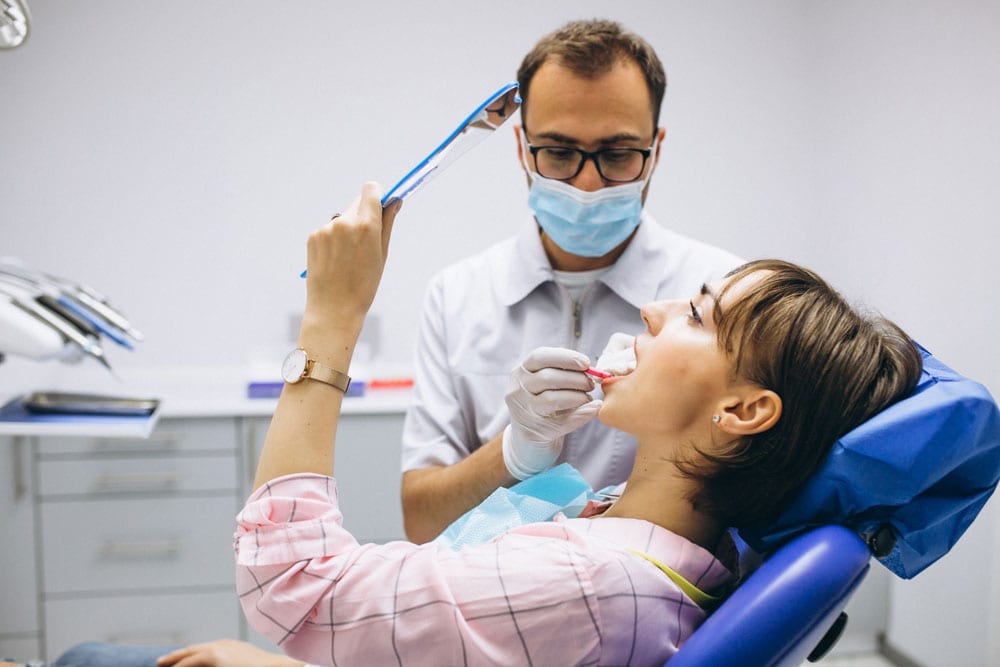There is a lot to do when you are expecting a new baby. Being pregnant brings its own responsibilities. It means a total change to your lifestyle, including eating habits, exercising, and also your oral hygiene habits, primarily because it influences your health and also the health of your baby.
For most women, routine dental visits for oral exams and professional teeth cleanings are considered safe during pregnancy, but do make sure to let your dental office know that you are pregnant and what month you are in, when you seek an appointment. In case of a high-risk pregnancy or if you suffer from some other medical condition, your dentist may recommend postponing any dental treatment. Be sure to let your dentist know if you have noticed any changes in your oral health such as swelling, redness or bleeding. Also let your dentist know if your medications change or if your physician has given you any special advice. The advantages of getting proper dental care during pregnancy far outweigh any potential risks.
It is vital to keep your gums and teeth healthy during your pregnancy as you run the risk of having plaque buildup on the teeth that often lead to gum irritation, swelling and bleeding. Good daily oral care habits are a must, like brushing your teeth twice a day with fluoride toothpaste, flossing between your teeth once a day and eating a balanced diet.
Here are some tips to ensure good oral health during pregnancy:
- Brush twice a day with an ADA accepted fluoride toothpaste
- Floss between your teeth, particularly before going to bed at night
- Use oral products with the ADA Seal of Acceptance.
- Eat a balanced diet. Limit snacking between meals
- Visit your dentist even during your pregnancy for a professional cleaning and check-up.
- Rinse at night with an antimicrobial mouth rinse
- During the period when you are vomiting frequently due to morning sickness, try rinsing with a teaspoon of baking soda mixed with water. Do not brush your teeth immediately after vomiting because the stomach acids come into contact with teeth, which can cause erosion of the tooth enamel.
How Can Pregnancy Affect Your Mouth?
Gingivitis – Your gums can become inflamed during pregnancy due to the hormonal changes you will experience which makes them sensitive to the bacteria in plaque. Some pregnant women are known to develop this condition known as “pregnancy gingivitis,” which is an inflammation of the gums that causes swelling, tenderness and gum bleeding, particularly when brushing or flossing. If this condition is left untreated, gingivitis progresses to even more serious forms of gum disease. Your dentist may recommend more frequent dental cleanings during your pregnancy to prevent this.
Medications – If you have a dental appointment during your pregnancy, do inform your dentist about your condition as there are some drugs that your dentist can use during and after dental treatment to ensure your comfort in the dentists’ chair. Talk to your dentist about any prescription or over-the-counter drug you may be using as it will help determine the type of drug prescribed for you. Your dentist will be able to consult with your physician to decide on what painkillers or antibiotics may be safe for you to take during the pregnancy. Discuss any oral concerns with your dentist and physician. Learn how to safely secure and dispose of any unused or expired medications, especially with children in the house.
X-Rays – In case of any dental emergency, you will probably need an X-ray or even if there is a dental problem diagnosed. Even though radiation from dental X-rays are extremely low, your dentist or hygienist will take cautionary steps to cover you with a leaded apron to minimize exposure to the abdomen. Your dental office will ensure that a lead thyroid collar is used to cover your throat to protect the thyroid from radiation.
Pregnancy Tumors – In some women, pregnancy tumors tend to show up on the gums, which are overgrowths of tissue. This is most common during the second trimester. These non-cancerous growths appear between the teeth and on gums from excess plaque. They bleed easily and have a reddish appearance. They can be removed by your dentist but they usually resolve on their own after your baby is born.




